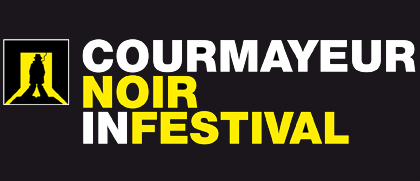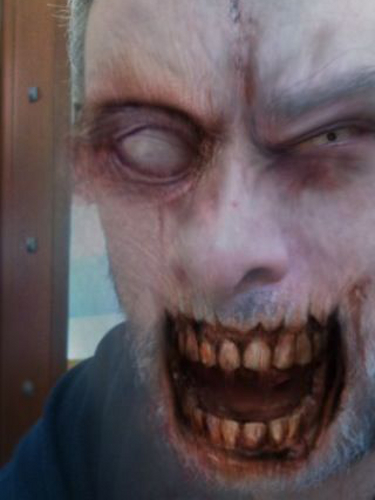Industrialized fear
For the third edition of Vedo Nero (the workshop day that each year Istituto Luce Cinecittà and Noirfest dedicate to new trends in Italian genre cinema), we chose to look at the "factories"Ł where the new Italian horror aesthetic is being forged. Dario Argento will be speaking to the young filmmakers who do not profess to be his heirs but are extremely well acquainted with his originality and mastery, and aren't afraid to strike on their own personal paths.
PHOTOGALLERY HIGH RES
For the third edition of Vedo Nero (the workshop day that each year Istituto Luce Cinecittà and Noirfest dedicate to new trends in Italian genre cinema), we chose to look at the "factories"Ł where the new Italian horror aesthetic is being forged. Dario Argento will be speaking to the young filmmakers who do not profess to be his heirs but are extremely well acquainted with his originality and mastery, and aren't afraid to strike on their own personal paths.
"Working with a lot or a little
money makes no difference. I's all about knowing how to tell a story,"
claims John Carpenter, one of Hollywood's leading independent genre
directors of the past 30 years. This could easily be the motto of the
morning dedicated to Italian horror, Vedo Nero 3, yet not all the
participants (directors, producers, distributors and actors) would fully
embrace the sentiment. Especially when one is forced to make
micro-budget movies by a cultural system that does not bestow upon genre
cinema (with the exception of comedies) its rightful dignity. These
directors all get wider distribution abroad than in Italy. Some has been
invited to Los Angeles; or taken under Sam Raimi's wing; or produced by
Uwe Boll; or awarded by Eli Roth.
For the first
time, Courmayeur Noir in Festival audiences will have an opportunity to
meet a large delegation of filmmakers who want to introduce Italian
cinema to a part of itself that it doesn't want to see. Perhaps because
their films are scary, or perhaps because the reality they depict is far
from sugarcoated.
Participants of the conference - which is presided over by Dario Argento and coordinated by Federico Greco - are:
Lorenzo
Bianchini, Luca Boni, Claudio Bronzo, Giovanni Costantino, Domiziano
Cristopharo, Manlio Gomarasca, Riccardo Paoletti, Raffaele Picchio, John
Real, Marco Ristori, Crisula Stafida, Edo Tagliavini, Ivan Zuccon.
LORENZO BIANCHINI
Director
Bianchini knows what fear is and has the courage to only depict it in
Friulian (subtitled for Italian audiences). He tends to make stories of a
historical flavor, in which anxiety is gradually insinuated in the
characters and viewers, to often become madness. He too often makes
no-budget films. His latest, Oltre il guado, screened at the Taormina
Film Festival.
CLAUDIO BRONZO
Bronzo and
his company Indastria Film came to prominence for producing the
successful The Gerber Syndrome: il contagio (2011). He is currently
developing several more horror projects and a documentary set in
Lithuania (Five).
GIOVANNI COSTANTINO
An
actor for over 20 years, as well as a film and theatre producer,
Costantinto also became a distributor three years ago. He is president
and founding partner of Distribuzione Indipendente, which has become a
fundamental entity for all Italian auteur and independent cinema. The
horror titles he has distributed include P.O.E. - Poetry of Eerie (an
episodic omnibus film) and Wrath of the Crows (by Ivan Zuccon).
DOMIZIANO DELVAUX CRISTOPHARO
A
director and performer, he studied visual arts at an art institute,
specializing in religious decorative arts. Very much an auteur, he is a
visual and conceptual experimenter. He makes low-budget films -
including Red Krokodil and House of Flesh Mannequins, and two collective
films inspired by Edgar Allen Poe - with enviable frequency. And wins
top international prizes with equal frequency. His upcoming work, The
Night Gaunts, was inspired by H. P. Lovecraft.
MANLIO GOMARASCA
In
1994, together with Davide Pulici, he co-founded what is today the most
important Italian genre cinema magazine, Nocturno, thanks to which
directors such as Deodato, Fulci, Massaccesi, Di Leo - as well as those
not known the larger audiences, including Fragasso and Mattei - finally
found a platform through which to make themselves heard. In 1999,
Gomarasca and Pulici made the documentary Joe D'Amato Totally Uncut, on
their friend Aristide Massaccesi/Joe D'Amato, directed by Roger Fratter.
Gomarrasca also works with diverse European festivals and has published
several books, including La piccola cineteca degli orrori.
FEDERICO GRECO
In
1997 he fulfilled his lifelong dream of making a documentary on Stanley
Kubrick, which was distributed throughout the world and was also turned
into a book. In 2005 he directed the feature horror mockumentary Road
To L. (which Castelli also turned into a Martin Mystère comic). His
other works include Liver, E.N.D. and the 2013 film Nuit Americhèn, with
GianMarco Tognazzi and Regina Orioli.
RICCARDO PAOLETTI
After
extensive experience working as an assistant director, he began
directing music videos (for, among others, Elio e le Storie Tese,
Zucchero, Battiato and Ligabue). His first documentary, Dailies, was
selected at the Rome Film Festival and the Festival dei Popoli. Of his
feature debut Neverlake he wrote: "At times monsters, ghosts and demons
are nothing compared to what the human brain can conceive in everyday
life"
RAFFAELE PICCHIO
Despite the fact
that his 2011 film Morituris - a Salò or the 120 Days of Sodom of
contemporary underground Italian horror cinema - did not make it past
the Italian censors (14 years ago, the same happened with Totò che visse
due volte by Ciprì and Maresco), it was picked up for distribution in
Finland, Sweden, Denmark, Japan, France and Germany after playing
numerous international festivals and markets.
JOHN REAL
Giovanni
Marzagalli, who goes by the stage name John Real, obtained two masters
at UCLA. The young filmmaker shot Native upon returning to Italy; the
film won three Golden Globes, including Best Debut Director of 2011. In
2013 he received further acclaim, for the dramatic thriller Midway:
Between Life and Death, which is among Italy's seven-title shortlist of
Oscar hopefuls.
MARCO RISTORI and LUCA BONI
Producers,
directors and screenwriters, Ristori and Boni began working together in
2006 and have since co-written and co-directed three horror films that
sold to a dozen countries. Their sophomore film Zombie Massacre (2013)
was produced by German director-producer Uwe Boll. Their third film,
Morning Star, will soon be released. They love zombies, blood and
fantasy, which they mix with macabre and often ironic skill.
CRISULA STAFIDA
At
the age of 11, the Italian-Greek actress moved to Trentino and later
studied acting in France. After appearing in diverse plays, TV shows and
films, she came to prominence among horror fans and horror directors as
a "scream queen" in the best tradition of Barbara Steele and Soledad
Miranda. Her roles include Giulia Silenzi in Federico Zampaglione's
Tulpa (2012) and Viola in Lucas Pavetto's medium-length film Marito
perfetto, which won awards in New York (Best Actress) and Mexico.
EDO TAGLIAVINI
As
a boy he wanted to become a scientist and drive to the moon in his
mother's Fiat 500. He became a skateboarder instead, and traveled the
world with money he won in an international contest. After studying at
the National Film School he decided directing was his path, to be
traveled in a Fiat 500, of course. Today, Tagliavini makes low-budget
films that do well internationally, including his feature debut Blood
Line.
IVAN ZUCCON
Considered one of
Italy's leading Lovecraft-ian directors (L'altrove, La casa sfuggita,
Colour from the Dark), Zuccon (born in 1972) has gained international
renown as a prolific and serious horror filmmaker. His films' strong
production values never belie their low budgets and are produced by
Zuccon through his Studio Interzona "factory" of longtime collaborators.
His latest film, Wrath of the Crows, was co-produced in the US by Zack
Ewans and features an internationally renowned cast that includes ex
Troma scream queen Tiffany Shepis.
[Bios prepared by Federico Greco]
PHOTOGALLERY HIGH RES


